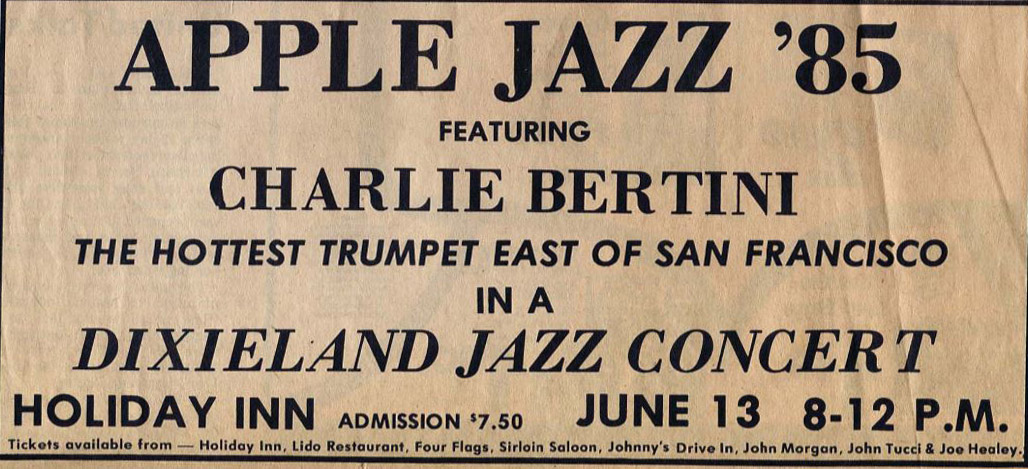APPLE JAZZ Owner Strikes Out in Latest TTAB Ruling
“[W]e will not infer from Respondent’s objections to Petitioner’s discovery requests that no responsive documents exist, particularly given the objections made concurrently with the responses.” – TTAB opinion.
Source: TTAB opinion (2021)
The Trademark Trial and Appeal Board (TTAB) on Wednesday, March 20, denied APPLE JAZZ mark owner Charles Bertini’s petition to cancel Apple, Inc.’s mark APPLE for entertainment services. While the Board found that Bertini had “proven and maintained his entitlement to a statutory cause of action,” it ultimately held that he had failed to make a prima facie showing of Apple’s abandonment of the APPLE mark for those services.
The decision is the latest in a long-running battle between Bertini and Apple over the use of the APPLE mark for entertainment services. Bertini’s APPLE JAZZ mark was registered in New York state in 1991 for entertainment services, and he began using the mark well before that, in 1985. Unaware that he did not have a federal registration, Bertini filed an opposition against Apple, Inc.’s federal registration for “Apple Music” in 2016, along with an application to register APPLE JAZZ with the USPTO.
Separately, after Apple used the APPLE mark as a defense in the Opposition, Bertini filed a Petition to Cancel it (Registration No. 4088195) on March 19, 2018, for nonuse/ abandonment, arguing that Apple, Inc. never used the mark in commerce for entertainment services listed in the Registration Certificate.
On February 23, 2021, the TTAB marked the Petition to Cancel “Ready for Decision,” but then on February 9, 2022, it issued an order suspending proceedings, stating that it had just come to the Board’s attention that the related Opposition case may affect the outcome of the cancellation petition. However, Bertini argued that the Board was aware of the Opposition in 2018, as the cover sheet on the Opposition filing referenced the related proceeding (Opposition No. 91229891, Serial No. 86659444).
In April 2023, the U.S. Court of Appeals for the Federal Circuit (CAFC) said the TTAB had legally erred in allowing Apple to claim absolute priority for all of the services listed in its application based on a showing of priority for one service. The court then denied Apple’s request for rehearing in July, and on November 9, 2023, the TTAB denied Apple’s motion to amend and terminated the opposition.
Then, in January of this year, the CAFC denied Bertini’s petition for a writ of mandamus asking the court to order the TTAB to decide the trademark cancellation case but it noted that it expected the TTAB decision to issue “promptly.”
In its discussion of the cancellation petition, the TTAB explained that Bertini’s evidence of abandonment–which included that Apple’s website, apple.com, as well as its Wikipedia entry, showed that Apple “does not use APPLE by itself but rather surrounded by other matter, e.g., APPLE STORE, APPLE TV or APPLE MUSIC, and that its manner of use shows APPLE as a trade name and not a source identifier”; and that Apple did not did not produce specific documents requested in discovery–was insufficient. “[W]e will not infer from Respondent’s objections to Petitioner’s discovery requests that no responsive documents exist, particularly given the objections made concurrently with the responses,” the TTAB wrote.
Overall, the Board found Bertini’s evidence of abandonment to be only circumstantial and listed a number of actions he could have taken to compel Apple to produce the evidence he was seeking:
“Petitioner could have taken the oral testimony deposition of Respondent to ascertain whether Respondent had indeed discontinued use of it registered mark and if so, whether it had any intent to resume use, but elected not to do so. Petitioner further could have compelled responses to his discovery requests or amended his requests to obviate the objections raised by Respondent. Petitioner, however, elected to proceed with discovery responses consisting largely of procedural objections rather than substantive responses and evidence showing use of the APPLE mark that Respondent believed was insufficient.”
The TTAB also rejected Bertini’s arguments that Apple should be sanctioned for submitting multiple copies of the same evidence to “burden and harass counsel for Petitioner,” explaining that “[w]hile we find Respondent’s evidentiary submissions to be less than focused and concise, we disagree that Respondent’s conduct in submitting its evidence should be subject to sanction.”
However, Charles Bertini’s counsel, James Bertini, said the fight to register APPLE JAZZ continues:
“In our continuing effort to register my client’s trademark APPLE JAZZ, which he began using in 1985, we intend to appeal this decision of the USPTO. It is well-known which services are provided by Apple Inc., and an ‘APPLE’ entertainment service was never listed among a lengthy list of its goods and services on its website. Nevertheless, the trademark court decided that it is somehow possible that Apple Inc. uses ‘APPLE’ for entertainment services. The company uses iTunes and Apple Music for entertainment services. Notably, the trademark court specifically stated that its decision is NOT a precedent.”
Eileen McDermott
Eileen McDermott is the Editor-in-Chief of IPWatchdog.com. Eileen is a veteran IP and legal journalist, and no stranger to the intellectual property world, having held editorial and managerial positions at […see more]







